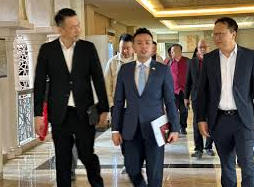Acting Transport Minister Chee Hong Tat reveals plans to increase direct flights, anticipating high travel demand after the upcoming mutual visa-free arrangement.
BEIJING: Singapore is set to discuss increasing direct flights with China as both nations prepare to implement a 30-day mutual visa-free travel scheme in early 2024. Acting Transport Minister Chee Hong Tat shared the news on Friday (Dec 8), stating that the visa exemption is expected to drive a surge in travel demand.
“We have already received requests from Chinese carriers to expand the number of flights during the 2024 Chinese New Year period,” Mr. Chee said, emphasizing Singapore’s readiness to facilitate these arrangements.
This announcement follows the 19th Joint Council for Bilateral Cooperation (JCBC) meeting co-chaired by Singapore’s Deputy Prime Minister Lawrence Wong and Chinese Vice Premier Ding Xuexiang. The JCBC, the highest-level forum between Singapore and China, serves to review and enhance bilateral cooperation.
Restoring and Expanding Air Connectivity
Currently, direct flights between Singapore and China are at 75% of pre-pandemic levels. Mr. Chee noted that discussions with China’s Ministry of Transport and Civil Aviation Authority will focus on restoring these numbers and potentially surpassing them.
“The next approval window for additional flight slots in China will be in February, ahead of the northern summer period from March to October,” he added.
Tour agencies in Singapore have already reported an anticipated spike in Chinese tourist demand following the visa exemption announcement.
Enhancing People-to-People Connections
Deputy Prime Minister Wong highlighted that the visa-free arrangement would facilitate more convenient travel for tourists, businesspeople, academics, and individuals with family ties.
“This agreement will enable closer people-to-people exchanges and support growing travel demands,” he said. Mr. Wong also noted that Singapore has visa-free arrangements with over 70 other countries, ensuring robust immigration checks remain in place.
Key JCBC Outcomes
The JCBC meeting produced significant outcomes, with 24 agreements signed across sustainability, food security, and trade. Future cooperation will target emerging areas such as low-carbon energy and digital economy initiatives.
“Our partnership is comprehensive, high-quality, and future-oriented,” Mr. Wong emphasized, citing strong people-to-people ties as the foundation for deepened collaboration.
Minister for National Development Desmond Lee noted Singapore’s contributions to the Tianjin Eco-City project, launched in 2008. He highlighted how Singapore continues to learn from China’s technological advancements, fostering mutual exchange.
Leadership Transition
When asked about speculation surrounding his co-chairing role at future JCBC meetings, Mr. Wong addressed the potential leadership transition.
Prime Minister Lee Hsien Loong previously stated his intention to hand over leadership to Mr. Wong before the next General Election, potentially as early as late 2024. Mr. Wong reassured that the transition remains a priority and will proceed smoothly if all goes well.








